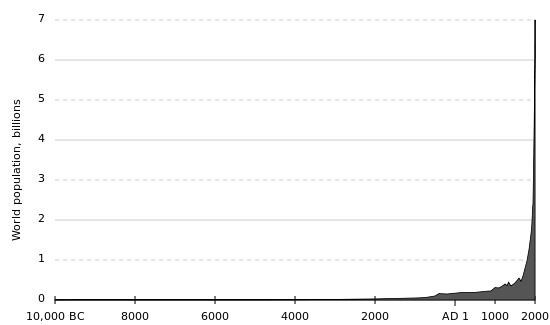Feeding the World
I recently turned a new age. Forty-six is now the number of years I've been here. (Not here here, of course. I've moved around and done stuff. It's not like I've been waiting for a bus or something.) To my eleven-year-old daughter, this is an impossible amount of time. To my twenty-six-year-old brother-in-law, the idea that I bought my first stereo system (kids, back in the olden days, when a teenager wanted to listen to super cool tunes, he...) thirty years ago, is a crazy thought. But today I'd like to discuss the following idea: I haven't been around very long.
The Earth, by contrast, has been around four and a half billion years. This is one of those deals where if the entire history of the world is a twenty-four-hour clock, I've only been around for the last tick of the second hand. But even if we only look at the era of human civilization, we kicked off this party over twelve thousand years ago. It took us most of that time to reach a global population of 1 billion people. This occurred around the year 1800. So here's the scary part: The population of the world when I got here was 3.5 billion and now it has doubled to over 7 billion! And I haven't been here very long!
The question is, how long till we double again? Sorry, the two questions are that one and can we double again given the limited resources our world can provide? Okay, last one, now, how are we going to feed all these people? The UN estimate says that currently 1 in 8 people on the planet are chronically undernourished. Over 20,000 people die of starvation every day right now. Will those numbers double along with the population, or will they increase exponentially? How can we let that happen?
There is a way that we can feed more people with our existing resources, which Meatless Monday is a part of. As John Robbins put it, so succinctly that it fit in the title of his book, "May All Be Fed: Diet For A New World." The following infographic from the Plantrician Project illustrates the solution far more eloquently than a mere 1000 words ever could.
You see, plants feed more people. MM is a step in the right direction, which is about more than healthy eating, water footprint, contribution to climate change, sustainability and less harm to animals, it is also about food and our ability to feed the planet. Today's traditional Japanese recipe is also a step in that direction because it is healthy, sustainable, satisfying, and, perhaps most of all, delicious. Thanks for making a difference!
Cheers,
Mark


Comments
Post a Comment